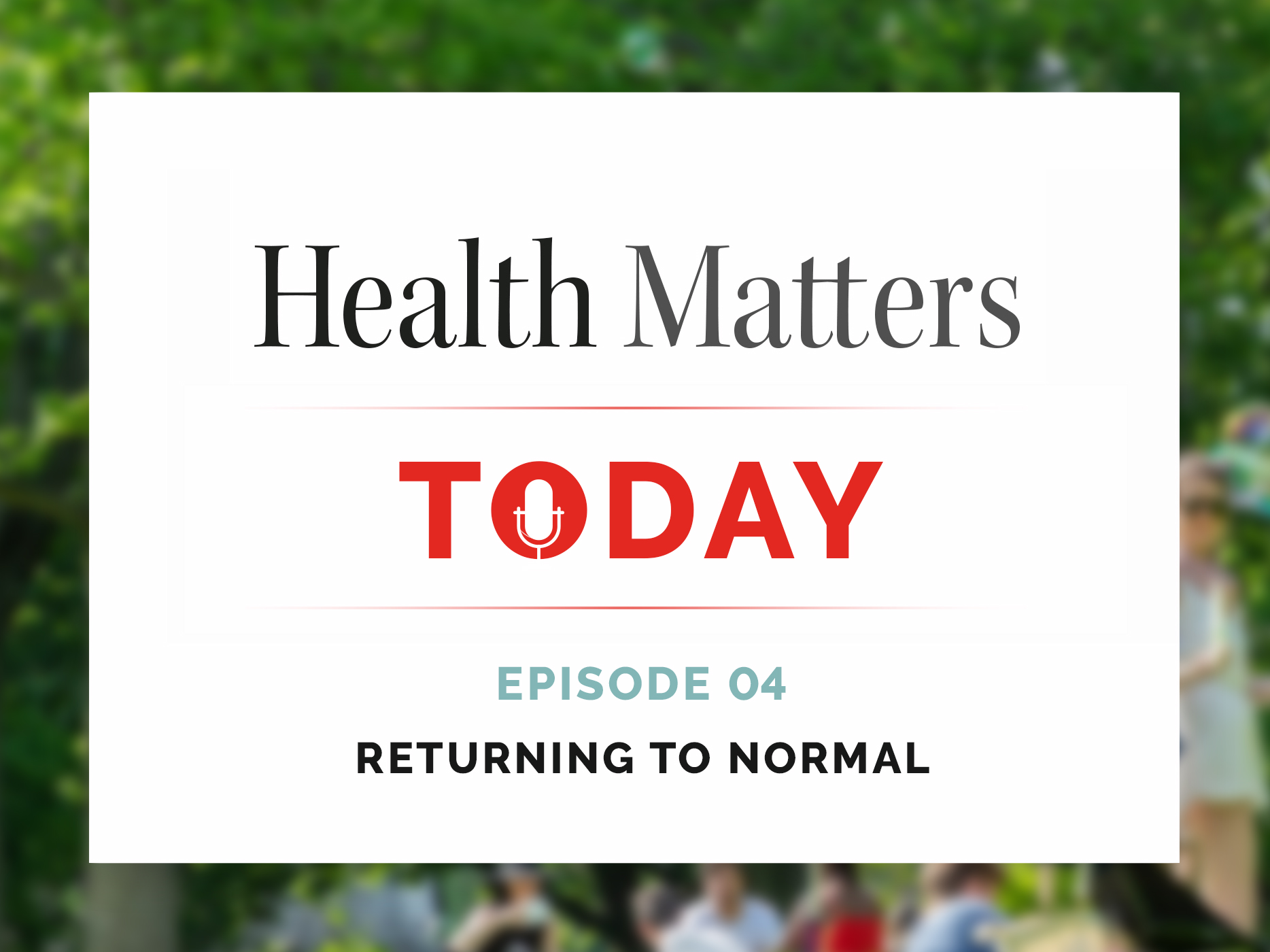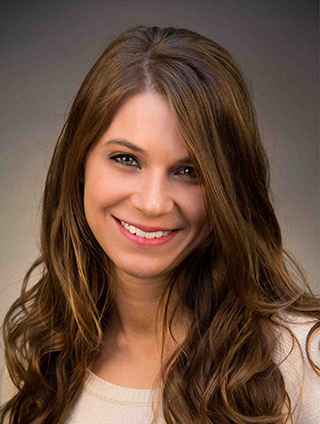Podcast: How to Navigate the New Normal and Ease Back into Life
An expert explains how to manage anxiety about reentering society amid this new phase of the pandemic.


With many COVID restrictions lifted as people head back to offices, travel more frequently, and return to public transit, there’s a welcome sense of a return to normal in the world – along with a measure of anxiety. Is it safe to attend in-person meetings, pack into subways, or go to big gatherings? Do we remember how to interact face to face? How do we continue to keep ourselves safe in this latest phase of the pandemic?
There’s even a name for this hesitation to re-enter into society: “cave syndrome.” In 2021, nearly half of Americans reported feeling uneasy about adjusting to in-person interaction as the pandemic enters a new phase, according to the American Psychological Society.
Many are also working to recover their mental health after a difficult few years. A study that came out in The Lancet in November 2021 found that mental health dramatically declined in 2020 worldwide, with an estimated 53 million additional cases of major depressive disorders and 76 million additional cases of anxiety disorders seen globally.
Health Matters spoke to Dr. Avital Falk, program director of the Intensive Treatment Program for OCD and Anxiety at the NewYork-Presbyterian Youth Anxiety Center, to offer guidance about how to deal with anxiety about returning to normal, and explain why we might be feeling some trepidation.
“It makes sense to be feeling anxious,” says Dr. Falk, who is also director of the Pediatric OCD, Anxiety, and Tic Disorders Program at Weill Cornell Medicine. “For a long time, many of these activities were dangerous. Our bodies and brains have been trained to react in a certain way when we face social situations, whether it’s riding the subway, being invited to a larger gathering, or even just seeing others indoors. There is a lot of uncertainty as we try to navigate this new phase of the pandemic and adapt to what feels like constant change.”
Listen to Health Matters Today

Dr. Falk shares seven tips for how we can set our boundaries and ease back into this return to normal and life as we had known it pre-pandemic, and cope with anxiety in a world that seems to change by the day.
Determine your personal guidelines.
Everyone’s circumstances are unique, so Dr. Falk recommends taking the time to think about what your personal boundaries are. Write them down if it helps with the thought process. “Some people might have very high-risk family members in their homes or may be high-risk themselves,” says Dr. Falk. “You might have unvaccinated children or other people who have been ineligible for the vaccine for various reasons. Finally, risk levels in different areas change based on case levels and hospitalization levels. So, you have to figure out what is safe for your immediate cluster and family, and then based on that, you can set some logical guidelines and boundaries about what is and isn’t safe for you.”
Next, put these guidelines into action. If you’ve determined you’re comfortable at an outdoor gathering, but begin to have an emotional reaction or feel fear, remind yourself that on a logical level, this is safe. “If there is limited actual danger, then we encourage facing that fear,” says Dr. Falk. “And the more you practice something, the easier it becomes.”

Dr. Avital Falk
Find your pace.
Some people might be able to jump right in once they determine their guidelines. For others, that may be more difficult. “If your circumstances allow, it can be helpful to take small steps. Make a plan for yourself,” says Dr. Falk. “You can absolutely build up your strength and confidence to make sure that your practices match the guidelines that you’ve decided are appropriate.”
Practice asserting yourself.
Even if you know your personal boundaries, “It’s very difficult to say no to something or to disagree with somebody,” acknowledges Dr. Falk. “That’s a skill in and of itself, learning how to assert for yourself what you’re comfortable with and where your boundaries are.”
Dr. Falk recommends practicing those tough conversations by role-playing with a family member. “You can politely decline and just say, ‘You know what? This is something that we can’t do just at the moment given our personal circumstances, but I can’t wait to join in in the future.’ You can also also suggest some alternate activity.”
Remember that everyone is feeling rusty with socializing.
Worried about awkward social interactions? You’re not alone. Remind yourself that everyone is in the same boat of re-learning how to socialize in person. It can even be something to laugh about. “Just like it takes practice to overcome fear, it takes practice to just get back in the groove on a social level,” says Dr. Falk. Don’t let the rustiness keep you from reaching out to people. The more you see and converse with others, the better it will feel and the more comfortable you will become.
Embrace the positive lessons.
It’s been a tragic few years with an unimaginable amount of loss, but there have been some silver linings. The slowed down pace of life allowed some people the chance to better define their values, practice self-care, and spend more time with loved ones. “If there are things that you’ve learned about yourself, your values, and what your needs are — and these are things that you can continue to fulfill in this new chapter— that’s incredible,” says Dr Falk. “I think it shows growth if you can carry that forward.”
Some social and professional obligations remain – if you’re not looking forward to play dates with certain parents, you may still want to do them because it fits in with your larger set of values of being inclusive and getting to know people in your community. But instead of an automatic yes to every invitation, “We can be more thoughtful about our own needs, what we’re sacrificing every time we do something, and what we’re sacrificing every time we don’t,” says Dr. Falk.
“If there is no actual danger, then we encourage facing that fear. And the more you practice something, the easier it becomes.”— Dr. Avital Falk
Be flexible.
Remember that things are always changing, so while it’s important to define your personal boundaries, it is just as critical to be open to adjusting them. “There has been so much change these past few years, and we are still in an evolving situation” says Dr. Falk. “I think it’s important to be flexible and respond to the changing circumstances. And just like how we had to roll with the changing guidance at the beginning of the pandemic, we have to roll with the changing guidance on the other end, too.”
Give yourself a break.
This has been a challenging time, and it’s important to recognize that just because things are technically safer doesn’t mean you have healed from everything that’s happened. It may take some time to process, heal, and recover. “And that’s not on anybody else’s timeline but your own,” says Dr. Falk. “Figure out what is good for you beyond CDC guidelines or safety. Don’t exert yourself too much if you’re still feeling overwhelmed.”
For anybody who does find their fears debilitating, reach out for professional help. “You can get some help to figure out how to manage those fears and anxieties, because you shouldn’t have to live that way,” says Dr, Falk. “We want you to live the life that you feel is safe and appropriate. And not one that’s dictated by your fears or anxieties.”
Listen to the full episode, which originally aired in May 2021.
Additional Resources
For more information on mental health services at NewYork-Presbyterian, visit the Department of Psychiatry at NewYork-Presbyterian.
Avital Falk, Ph.D. is the program director for the Intensive Treatment Program for OCD and Anxiety at the NewYork-Presbyterian Youth Anxiety Center and the director of the Pediatric OCD, Anxiety, and Tic Disorders Program at Weill Cornell Medicine. She is also an assistant professor of psychology in clinical psychiatry at Weill Cornell Medicine.

